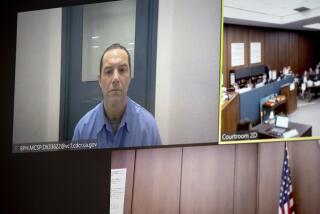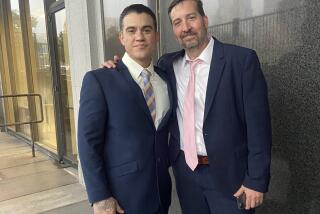Man exonerated in 1998 Riverside killing sues county and Sheriff’s Department
A man who spent decades in prison before DNA exonerated him last year in the killing of a female co-worker has sued Riverside County and the Sheriff’s Department, accusing officials of concealing exculpatory evidence from prosecutors.
Horace Roberts, 61, was convicted second-degree murder in the 1998 slaying of Terry Cheek and sentenced to 15 years to life in prison.
Twenty years later, forensic tests forced by the California Innocence Project revealed in March 2018 that DNA from Cheek’s fingernails did not belong to Roberts but to someone related to her husband.
Last October, two weeks after Roberts was secretly released by Riverside County prosecutors, Cheek’s husband, Googie Harris Sr., and a nephew, Joaquin Leal III, were arrested on suspicion of killing her.
The woman vanished the night of April 13, 1998. She never arrived at her late-night shift at Quest Diagnostics, where she worked with Roberts. Four days later, her strangled body was found along the highway near the craggy shore of Corona Lake, halfway between Corona and Lake Elsinore.
The last people to see her alive were said to be her two daughters and her husband.
Suspicion quickly turned to Roberts, who colleagues at the medical company suspected was having an affair with Cheek. Roberts lied to Riverside County sheriff’s deputies when questioned about the liaison. He also lied to co-workers about the affair, although his lawyers said he did so out of shame and embarrassment. But detectives hunting for a killer saw the untruths as an effort to cover up his role in the slaying.
During three trials — two of which ended in a hung jury — prosecutors showed jurors Roberts’ inconsistent statements, characterizing them as lies designed to cover up a murder. They pointed out the presence of his truck near the crime scene and a purse in his possession that one of Cheek’s daughters swore her mother had left with the night she disappeared.
But more than any other evidence, they pointed to a Lorus watch found next to Cheek’s body. Roberts said he owned such a watch, an acknowledgment that ultimately would lead to his conviction.
From his prison cell, Roberts reached out to the California Innocence Project.
Over the next decade, lawyers sought DNA testing from Cheek’s fingernail scrapings, the rope that was used to strangle her and the watch found near her body.
The organization’s legal team filed a petition in 2013 for a writ of habeas corpus on behalf of Roberts. Michael Semanchik, managing attorney for the California Innocence Project, said the watch had the DNA of Harris’ son on it and clearly did not belong to Roberts. Superior Court Judge David A. Gunn, however, denied the petition in 2014, finding that Roberts did not “completely undermine the entire structure upon which the prosecution is based” and that the evidence did not unerringly point to his innocence.
Gunn, nonetheless, did note that if he were to use the lesser burden for “material false evidence,” he probably would have granted a new trial because the evidence “surely raises the specter of reasonable doubt.” Gunn also greenlighted more DNA testing of materials in the case. In 2017, crime scene evidence was sent to the California Department of Justice laboratory in Riverside, which conducted a more sophisticated DNA test than what was available in 1998.
The DNA from Cheek’s left-hand fingernails were matched to Leal in March 2018. His DNA became part of the state criminal database after he was convicted of oral copulation of an unconscious victim two decades earlier.
He was charged with molesting a child younger than 14 in 1998, two months after Cheek’s killing. The victim was the child of a woman Harris had dated after his wife’s death.
After the new DNA discovery, Leal and Harris became the focus of a new homicide investigation, and the two have since been charged in Cheek’s slaying.
Riverside Dist. Atty. Mike Hestrin, who worked with Roberts’ lawyers to free him a year ago, asked a judge to find Roberts factually innocent in Cheek’s killing, scrubbing his entire criminal history connected to her death.
More to Read
Start your day right
Sign up for Essential California for news, features and recommendations from the L.A. Times and beyond in your inbox six days a week.
You may occasionally receive promotional content from the Los Angeles Times.







